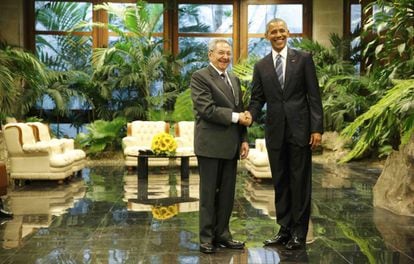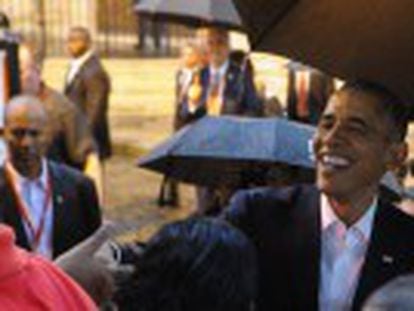Castro: “Give me a list of political prisoners and I will release them”
The Cuban and US presidents face reporters after their historic meeting in Havana on Monday. Obama, meanwhile, says embargo will end, but says he “can’t be entirely sure” when

Barack Obama and his Cuban counterpart Raúl Castro spoke to the world’s press on Monday afternoon, after they held a historic behind-closed-doors meeting as part of the United States president’s 48-hour visit to the Caribbean island.
The encounter between the two leaders came in the midst of a thawing of relations between the two countries, which has been underway for just over a year.
The pair took to the podiums after their private discussions, with Castro welcoming his guest.
“Mr President Barack Obama. We are pleased to welcome you on this, the first visit of a US president to our country in 88 years.
“In the 15 months that have passed since the decision was made to establish diplomatic relations, we have achieved concrete results.”
After covering other progress the two countries have made, he also sought to defend his own country from criticism.
“We defend human rights. We believe civil, political, economic and cultural rights are indivisible, interdependent and universal.”
He then went on to criticize the United States: “We find it inconceivable that a government does not ensure the right to healthcare, education, social security, food, and development, equal pay, and the rights of children.
”We oppose political manipulation and double standards regarding rights,” he continued, making a veiled criticism of Washington’s policies over Guantánamo Bay versus its rhetoric on human rights.
But Castro emphasized that he Obama agreed to continue dialogue. “We should learn the art of co-existing with our differences in a civilized way.
“The revolutionary government is willing to move toward normalizing relations because we are convinced both our countries can co-exist and cooperate in a civilized manner and for their mutual benefit, contributing to peace, security and development in our continent and around the world.”
Castro called Obama’s efforts to end the embargo “positive”, and called on US Congress to support him.
Castro also described the meeting with Obama as an important step not just for Cuba and the United States “but for the whole of Latin America.” He highlighted efforts to reach new trade deals between the two countries, particularly in the area of telecommunications.
Castro referred to what he called the “illegal” occupation of the naval base at Guantanamo Bay, calling on the United States to return sovereignty to Cuba.
The Cuban leader said that he and Castro had discussed the situation in Venezuela and the peace process in Colombia. “There are deep differences between our countries that will not go away because we have different ideas on many subjects, such as political systems, democracy, human rights, social justice, international relations, and world peace and stability.
“The embargo is the main obstacle to the development of our economy and the well-being of the people of Cuba,” he added.
At one point, Castro was asked by a Cuban-American journalist why the country held political prisoners, and why they had not been freed.
“Give me the list of political prisoners,” was the Cuban president’s response. “If there are political prisoners, before night falls they will be freed.”
President Barack Obama opened his address by saying that for more than half a century it would have been “unimaginable” to hear an American president speak from Cuba.
He highlighted the importance to him of bringing his family on the trip, saying: “We were moved by the Cubans who received us yesterday […]. We were grateful for the experience to see Old Havana.”
Obama explained to the press that he had “very frank and candid conversations” about human rights with Castro, noting their differences.
At the same time he praised Cuba’s “enormous achievements” in education and healthcare, adding the US had no interest in directing the island’s fate.
That will “not be decided by the United States or any other nation,” he said. “Cuba is sovereign and rightly has great pride. And the future of Cuba will be decided by Cubans, and not by anybody else.”
Obama added that he appreciates Castro’s criticism of access to basic rights in the US: “We welcome that constructive dialogue as well. Because we believe that […] we can learn and make the lives of our people better.”
“I’m very pleased that we’ve agreed to hold our next Cuba-US human rights dialogue in Havana,” he said.
The president then began his own laundry list of diplomatic achievements in the last year, explaining that the US had expanded new flights to the island, and had resumed cruises and ferry services, meaning “even more Americans [will be] visiting Cuba in the years ahead and appreciating the incredible history and culture of the Cuban people.”
He then moved onto trade, explaining that new rules will allow the US dollar to be used more widely, permit more access to the dollar in international transactions, and allow Cubans in the US to earn salaries.
“Just as I continue to call on Congress to lift the trade embargo, I encouraged President Castro to ease restrictions on business in Cuba itself,” Obama said.
He added his desire to help bring Cuba online. “In the 21st century countries cannot be successful unless their citizens have access to the internet,” he said.
“Even as Cubans prepare for the arrival of the Rolling Stones, we’re moving ahead [with other cultural exchanges],” Obama continued. “We all look forward to tomorrow’s matchup between the Tampa Bay Rays and Cuba’s national team, and more broadly we’re moving ahead with agreements on health, science and the environment.”
He gave special praise to Cuban doctors who traveled to west Africa to combat Ebola.
As for the trade embargo, Obama placed the blame on Congress for tying his hands. “Frankly Congress is not as active as I would like during presidential election years,” he said, but added that he remained hopeful. “The embargo’s gonna end,” he said. “When, I can’t be entirely sure … and the path is going to continue beyond my administration.
“I’m absolutely confident that if we stay on this course we can achieve a better and brighter future for the Cuban and American people,” he concluded, signing off with a “Muchas gracias.”












































